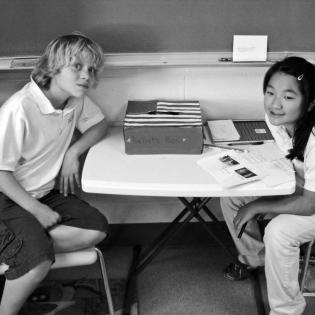Making our Voices Heard: Vote
Raise awareness of the importance of freedom of speech and the opportunity to voice one's opinion without fear of reprisal, as principles basic to a democracy. The learners investigate ways to have a positive influence in encouraging eligible voters to make their voices heard at the polls during elections.
The learner will:
- articulate the importance of freedom of speech and voicing one's opinions during election season--ultimately by voting
- explore possible reasons for poor voter turnout.
- explore ways to influence and encourage eligible voters in the community to voice their opinions at the polls.
- articulate an understanding of the importance of participating in the elections process as a way to promote the common good in their school, community, state, and nation.
Write a one or two sentence reflection after service or learning using at least three of the following prompts:
- I learned how to…
- I changed my mind about…
- I was feeling…
- I thought ….
- I was hoping that…
- I became convinced of…
Dr. Martin Luther King’s I have a Dream Speech
Wake Up Everybody video by Babyface
Voter turnout statistics from the United States Election Project http://www.electproject.org/home/voter-turnout/voter-turnout-data
Instructions
Anticipatory Set:
Play a recording of key parts of Dr. Martin Luther King’s I have a Dream Speech and/or watch the music video “Wake Up Everybody" by Babyface. Encourage youth to listen carefully, and write down key words about the value of taking action for the good of all.
Ask youth to share what they wrote and capture their ideas on the display board. Discuss what they heard and what it challenged them to think and do, and discuss why they think that.
Discuss what it means to be heard. In what settings do youth feel their voice is heard? In what settings do they feel they don't have a voice. What can be done to increase one's influence (not just in voting, but in other life situations)?
Highlight the fundamental concept of freedom of speech and voicing one's opinion without fear of reprisal. Discuss how this is supposed to be accomplished in our electoral system and why voting is so important to the democratic form of government.
Discuss how participating in the election process is something we can do as a responsible citizen and why it is so important that everyone who is eligible take advantage of the opportunity to participate in this process.
Have youth make predictions of the percentage of eligible voters nationwide who actually made sure their voices were heard in the last National Election. Look it up from the United States Election Project http://www.electproject.org/home/voter-turnout/voter-turnout-data
Ask the learners to offer their opinions as to why this percentage might be so low.
Share data regarding the percentages for their local area, town, city, and/or state's voter turnout. (Teacher Note: State-level info data can be obtained from the United States Election Project which also links to the states' Secretaries of State data at the district level. Your local county or township clerk's office can help with data at the precinct level.
Talk about what is needed, based on all the data, to address this problem. What are ways they could promote better voter turnout in their community/state?
Brainstorm and discuss ideas, then follow through to take action.
Here is one simple idea: https://www.learningtogive.org/resources/get-out-vote
Take action to encourage adults to vote.
Philanthropy Framework
-
Strand PHIL.II Philanthropy and Civil Society
-
Standard PCS 05. Philanthropy and Government
-
Benchmark HS.11 Discuss why organizations in the civil society sector work to protect minority voices.
-
Benchmark HS.12 Explain why private action is important to the protection of minority voices.
-
Benchmark HS.2 Discuss civic virtue and its role in democracy.
-
-
